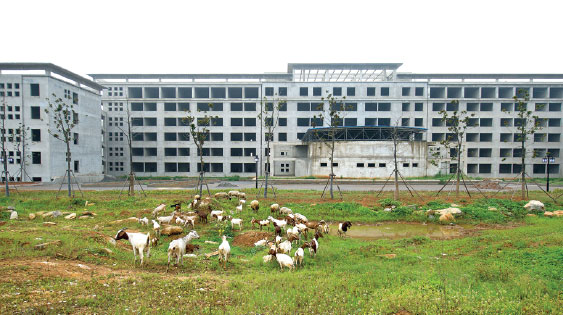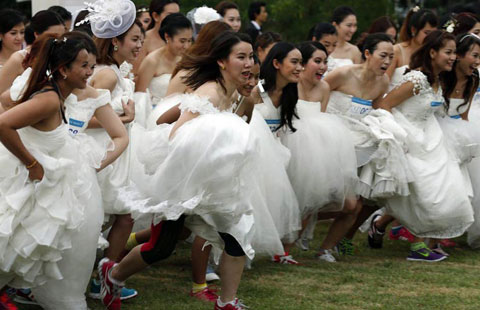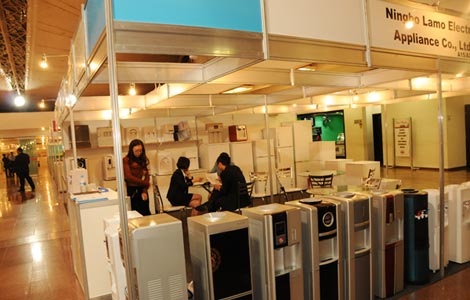Building ban begins to bite
Updated: 2014-11-25 07:43
By An Baijie(China Daily)
|
||||||||
|
The local government offices in Xiaoxian county in Anhui province have become a grazing area for sheep. The complex was abandoned two years ago after the then-county Party chief was arrested on corruption charges. Du Yu / Xinhua |
Oversized offices
In May 2013, Industrial Economy News published a report claiming that the Taxation Bureau in Xiaogan city in Central China's Hubei province had built a luxurious block in which the offices of the 100 or so officials measured an average 200 square meters.
Construction of luxurious offices has prompted public disquiet nationwide, and many local governments are stepping up their efforts to implement the central government's ban.
In December, the government of the southwestern province of Sichuan announced that it had canceled 117 new projects to build government offices and that six officials had been punished, according to a report by Xinhua News Agency.
Xu Hui, a professor at the National Defense University in Beijing, said construction of a large number of military buildings was halted last year in accordance with the ban.
The management of military expenditure has been tightened since the "eight-point" frugality rules were issued in late 2012, he said. Under the rules, put forward by the Central Committee of the Communist Party of China, officials were ordered to get closer to the people by eradicating undesirable work methods, including excessive bureaucracy, hedonism, and extravagance.
Last year, 30,420 officials were punished by the anti-graft authorities for violating the new austerity rules, according to the CPC Central Commission for Discipline Inspection, China's top anti-graft watchdog.
In late June, the State Council's Legislative Affairs Office began soliciting public opinion over a draft regulation concerning government buildings. According to the draft, officials will be punished if they approve the construction of office buildings without first obtaining permission from higher-level government departments.
The draft also proposed that the budgets for government offices should be more tightly controlled, and the construction of large squares or parks around public buildings should be prohibited.
Ren Jianming, a professor of clean-governance research at Beihang University in Beijing, said the construction of luxurious government buildings reflects loopholes in the budgetary system.
He added that the National People's Congress is unable to effectively supervise local government expenditure because government departments are obliged to seek approval from the body when they wish to spend public funds, but the NPC can only inspect expenditure reports once a year during its annual session. As a result, public funds have been misused, and the construction of luxurious buildings has led to a number of officials being investigated on suspicion of corrupt practices and allegations they have accepted bribes from the project contractors, he said.
Ren said the best way to solve the problem would be to ensure that information relating to government expenditure is available in a more transparent and detailed way so the public can understand where the funds are being spent and can supervise local spending programs.
Contact the writer at anbaijie@chinadaily.com.cn
Lyu Li in Hefei contributed to this story.
Most Viewed
Editor's Picks

|

|

|

|

|

|
Today's Top News
New visas a boon to real estate
China records 497,000 people with HIV/AIDS
Ailing school district seeks Chinese help
Web options proliferate for Chinese shoppers
Artists seek US audiences
Alibaba, Amazon in online battle
HK protesters clash with police outside govt headquarters
Cross-border e-commerce booming
US Weekly

|

|
















